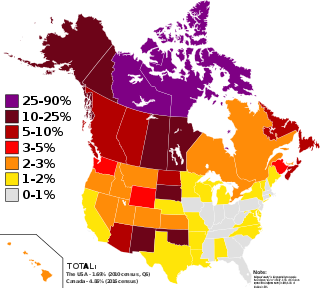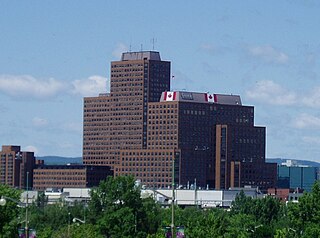Related Research Articles

Indigenous peoples in Canada are the Indigenous peoples within the boundaries of Canada. They comprise the First Nations, Inuit, and Métis, representing roughly 5.0% of the total Canadian population. There are over 600 recognized First Nations governments or bands with distinctive cultures, languages, art, and music.
First Nations is a term used to identify Indigenous peoples in Canada who are neither Inuit nor Métis. Traditionally, First Nations in Canada were peoples who lived south of the tree line, and mainly south of the Arctic Circle. There are 634 recognized First Nations governments or bands across Canada. Roughly half are located in the provinces of Ontario and British Columbia.
The minister of Crown–Indigenous relations is a minister of the Crown in the Canadian Cabinet, one of two ministers who administer Crown-Indigenous Relations and Northern Affairs Canada (CIRNAC), the department of the Government of Canada which is responsible for administering the Indian Act and other legislation dealing with "Indians and lands reserved for the Indians" under subsection 91(24) of the Constitution Act, 1867. The minister is also more broadly responsible for overall relations between the federal government and First Nations, Métis, and Inuit.
In Canada, an Indian reserve is defined by the Indian Act as a "tract of land, the legal title to which is vested in Her Majesty, that has been set apart by Her Majesty for the use and benefit of a band." Reserves are areas set aside for First Nations, one of the major groupings of Indigenous peoples in Canada, after a contract with the Canadian state, and are not to be confused with Indigenous peoples' claims to ancestral lands under Aboriginal title.

The Indian Act is a Canadian Act of Parliament that concerns registered Indians, their bands, and the system of Indian reserves. First passed in 1876 and still in force with amendments, it is the primary document that defines how the Government of Canada interacts with the 614 First Nation bands in Canada and their members. Throughout its long history, the act has been a subject of controversy and has been interpreted in different ways by both Indigenous Canadians and non-Indigenous Canadians. The legislation has been amended many times, including "over five major changes" made in 2002.
The Federal Interlocutor for Métis and Non-Status Indians was a title and role in the Canadian Cabinet that provided a liaison for the federal Canadian government, and its various departments, to Métis and non-status Aboriginal peoples, and other off-reserve Aboriginal groups.

Crown–Indigenous Relations and Northern Affairs Canada is the department of the Government of Canada responsible for Canada's northern lands and territories, and one of two departments with responsibility for policies relating to Indigenous peoples in Canada.
The Royal Commission on Aboriginal Peoples (RCAP) was a Canadian royal commission established in 1991 with the aim of investigating the relationship between Indigenous peoples in Canada, the Government of Canada, and Canadian society as a whole. It was launched in response to status and rights issues brought to light following events such as the Oka Crisis and the failure of the Meech Lake Accord. The commission culminated in a final report of 4,000 pages, published in 1996 and set out a 20-year agenda for implementing recommended changes.
The Congress of Aboriginal Peoples (CAP), founded in 1971, is a national Canadian aboriginal organization that represents Aboriginal peoples who live off Indian reserves in either urban or rural areas across Canada. As of 2011 more than 70% of Aboriginal people live off-reserve.
In Canada, an Indian band, First Nation band or simply band, is the basic unit of government for those peoples subject to the Indian Act. Bands are typically small groups of people: the largest in the country, the Six Nations of the Grand River First Nation had 22,294 members in September 2005, and many have a membership below 100 people. Each First Nation is typically represented by a band council chaired by an elected chief, and sometimes also a hereditary chief. As of 2013, there were 614 bands in Canada. Membership in a band is controlled in one of two ways: for most bands, membership is obtained by becoming listed on the Indian Register maintained by the government. As of 2013, there were 253 First Nations which had their own membership criteria, so that not all status Indians are members of a band.
The Standing Committee on Foreign Affairs and International Development (FAAE) is a committee in the House of Commons of Canada that focuses on Canada's foreign policy and international development.
Anthony "Tony" Belcourt OC LL.D. (Hon.) is a Métis rights leader and activist in Canada. He was the first president of the Native Council of Canada (1971-1974). He is best known for his work as the founding president of the Métis Nation of Ontario in 1993 and his leadership through the Powley Case in 2003.
The 1969 White Paper was a policy paper proposal set forth by the Government of Canada related to First Nations. Prime Minister Pierre Trudeau and his Minister of Indian Affairs, Jean Chrétien, issued the paper in 1969. The White Paper proposed to abolish all legal documents that had previously existed, including the Indian Act, and all existing treaties within Canada, comprising Canadian Aboriginal law. It proposed to assimilate First Nations as an ethnic group equal to other Canadian citizens. The White Paper was met with widespread criticism and activism, causing the proposal to be officially withdrawn in 1970.

Canadian Aboriginal law is the body of law of Canada that concerns a variety of issues related to Indigenous peoples in Canada. Canadian Aboriginal Law is different from Canadian Indigenous law: In Canada, Indigenous Law refers to the legal traditions, customs, and practices of Indigenous peoples and groups. Aboriginal peoples as a collective noun is a specific term of art used in legal documents, including the Constitution Act, 1982, and includes First Nations, Inuit and Métis people. Canadian Aboriginal law provides certain constitutionally recognized rights to land and traditional practices. Canadian Aboriginal Law enforces and interprets certain treaties between the Crown and Indigenous people, and manages much of their interaction. A major area of Aboriginal law involves the duty to consult and accommodate.
The Ministry of Indigenous Affairs and First Nations Economic Reconciliation is the Government of Ontario ministry responsible for issues relating to First Nations, Métis and Inuit in Ontario. The current Minister of Indigenous Affairs is Hon. Greg Rickford who sits in the Executive Council of Ontario or cabinet.
The Canadian Indian Health Transfer Policy provides a framework for the assumption of control of health services by Indigenous peoples in Canada and set forth a developmental approach to transfer centred on the concept of self-determination in health. Through this process, the decision to enter into transfer discussions with Health Canada rests with each community. Once involved in transfer, communities are able to take control of health program responsibilities at a pace determined by their individual circumstances and health management capabilities.
The following is an alphabetical list of topics related to Indigenous peoples in Canada, comprising the First Nations, Inuit and Métis peoples.

According to the latest available data, Statistics Canada estimates 4,157 suicides took place in Canada in 2017, making it the 9th leading cause of death, between Alzheimer's disease (8th) and cirrhosis and other liver diseases (10th). In 2009, there were an estimated 3,890 suicide deaths.
Indigenous or Aboriginal self-government refers to proposals to give governments representing the Indigenous peoples in Canada greater powers of government. These proposals range from giving Aboriginal governments powers similar to that of local governments in Canada to demands that Indigenous governments be recognized as sovereign, and capable of "nation-to-nation" negotiations as legal equals to the Crown, as well as many other variations.
Recognition and Implementation of Indigenous Rights Framework (RIIRF) is a legislation and policy initiative intended to be undertaken in "full partnership with First Nations, Inuit, and Métis Peoples" that was announced during a speech in the House of Commons of Canada by Prime Minister, Justin Trudeau on February 14, 2018. It was "meant to enshrine the Constitution's section 35, which affirms Aboriginal rights, in federal law, allowing First Nations to reconstitute their governance structures outside the Indian Act."
References
- ↑ "Standing Committee on Aboriginal Affairs and Northern Development". Parliament of Canada. Archived from the original on 2013-05-19. Retrieved 2011-02-27.
- ↑ "Subcommittee on Agenda and Procedure (SAAN) - Subcommittees". Parliament of Canada. Archived from the original on 2012-08-28. Retrieved 2012-01-13.